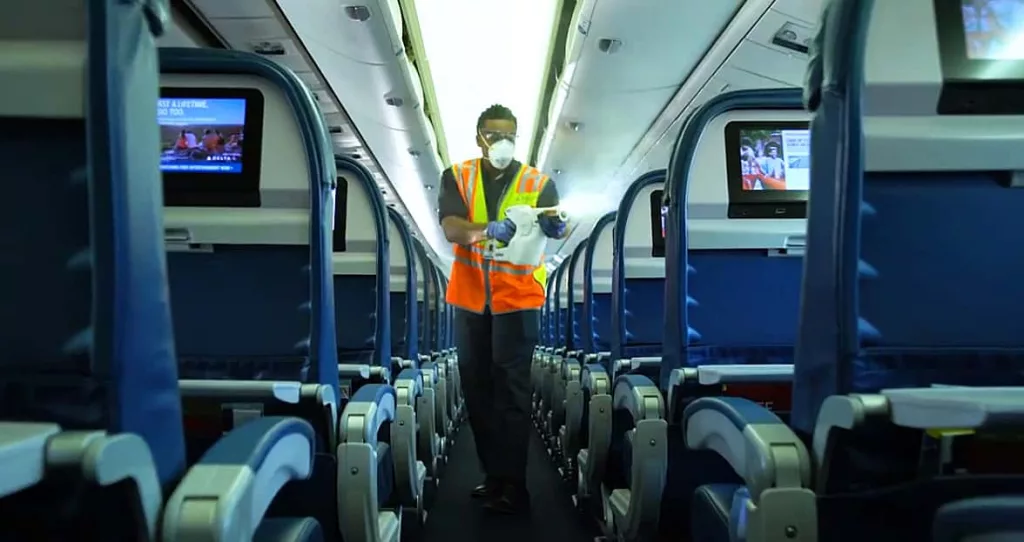Delta Airlines, a major carrier at South Bend International Airport, is one of the first to publicly declare that the impact of the COVID-19 Coronavirus is beginning to show up on the carrier’s bottom line, forcing them to undertake cost reductions to protect the company going forward, even as they perform extra safety measures on board their aircraft.
Already having made it clear that protecting the health and safety of both customers and their own employees is their top priority, Delta is responding to the reduced passenger traffic by removing some flights to adjust the system’s capacity accordingly.
South Bend International Airport has a number of routinely scheduled Delta flights, and if your travel plans include Delta, you will likely hear directly from the airline should your flight be canceled due to capacity issues, however you should always be proactive and check ahead before making your way to the airport for a planned journey. The carrier did not immediately identify where flight cuts would take place.
The airline was already undertaking significant efforts to protect the health and safety of the traveling public and their employee base by enhancing cleaning efforts on board, including regular fogging of each aircraft in the fleet as shown in the screen capture from a brief video provided by the airline and shared in the photo accompanying this story on Moody on the Market.
Delta is undertaking both cost reduction and cash flow enhancing initiatives to protect its financial position, but has made it clear that their top priority is protecting everyone’s health.
Delta is announcing additional steps to address the financial impact of the COVID-19 (coronavirus) outbreak, with CEO Ed Bastian saying, “In the weeks since COVID-19 emerged, Delta people have risen to the challenge, taking every possible action to take care of and protect our customers during a stressful time,” and adds, “As the virus has spread, we have seen a decline in demand across all entities, and we are taking decisive action to also protect Delta’s financial position. As a result, we have made the difficult, but necessary decision to immediately reduce capacity and are implementing cost reductions and cash flow initiatives across the organization.”
Bastian adds, “Over the last 10 years, we’ve transformed Delta by strengthening the balance sheet, diversifying our revenue streams and enhancing operational and financial flexibility. The environment is fluid and trends are changing quickly, but we are well positioned to manage this challenge and are taking actions to ensure that Delta maintains its leadership position and strong financial foundation.”
To align capacity with expected demand, Delta is reducing system capacity by 15 points versus its plan, with international capacity reduced by 20-25 percent, and domestic capacity reduced by 10-15 percent. The company will continue to make adjustments to planned capacity as demand trends change.
By region, reductions include:
| Entity | % of Total FY19 Revenue | Capacity Reductions |
| Pacific | 6% | Down 65% |
| Trans-Atlantic | 15% | Down 15-20% |
| Domestic | 72% | Down 10-15% |
| Latin | 7% | Down 5% |
Delta is undertaking cost reduction initiatives, including:
- Instituting a company-wide hiring freeze and offering voluntary leave options
- Parking aircraft, and evaluating early retirements of older aircraft
In addition, the recent fuel price decline provides approximately $2 billion of full-year expense benefit.
Delta has also made the following cash flow decisions:
- Deferring $500 million in capital expenditures
- Delaying $500 million of voluntary pension funding
- Suspending share repurchases
Delta has an investment-grade balance sheet, providing ready access to capital markets and bank financing. The company recently announced the issuance of $1 billion of secured aircraft debt at a blended rate of 2.09-percent and intends to use the proceeds to fund $1 billion of scheduled debt maturities in March.
Delta’s leverage ratio is at the low-end of its targeted range of 1.5 to 2.5 times adjusted debt to EBITDAR. Liquidity is strong and expected to be at least $5 billion at the end of the March quarter. In addition, Delta has approximately $20 billion of unencumbered assets, including $12 billion in aircraft.






